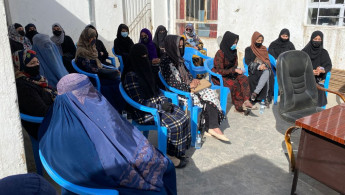Afghan and Iranian women want oppression against them to be labelled 'gender apartheid'
Afghan and Iranian women launched a campaign on Wednesday, coinciding with International Women's Day, to have their systematic subjugation by authorities recognised as "gender apartheid".
In an open letter, female campaigners from across both countries and abroad called for the legal understanding of apartheid to be expanded to include systems that deliberately treat women as second-class citizens.
Currently, this label refers to the systematic discrimination of other racial groups, as happened in South Africa under white-minority rule, and currently in Palestine.
The document, shared on the website endgenderapartheid.today, was signed by Iranian Nobel peace prize laureate Shirin Ebadi, the first female deputy speaker of the Afghan parliament Fawzia Koofi, a commissioner of the Afghan Independent Human Rights Commission, and many other predominant female Afghan and Iranian activists.
In Iran, women are banned from many fields of study, sporting events & from obtaining a passport & traveling outside the country without their husband’s permission. Women’s lives & testimony are worth half a man under the law.
— Gissou Nia | گیسو نیا (@GissouNia) March 8, 2023
This treatment has a name: GENDER APARTHEID. pic.twitter.com/eFYriUuXm3
"While representing a distinct form of apartheid from that in South Africa, the components of systematic segregation and subjugation that makeup apartheid are present in Afghanistan and Iran today," the letter read.
Women in Taliban-ruled Afghanistan are erased from public life via decrees issued by the Taliban administration that includes bans on female education and employment, long-distance journeys without a male chaperone, and restrictive dress codes.
Iranian women face state-sponsored violence if they violate rules on what they can wear, as well as freedom of speech and movement. They are also banned from studying multiple subjects, and from obtaining a passport or travelling outside the country without their husband's permission.
"The situations in the Islamic Republic of Iran and under the Taliban in Afghanistan are not simply cases of gender discrimination," the letter said.
"These systems are perpetuating a more extreme, systematic and structural war against women designed to dehumanize and repress them for purposes of entrenching power."
Women are also subject to restrictions in Iran with a feminist-led protest movement emerging in the country following the death in custody last year of Mahsa Amini, allegedly detained over her dress.
The term apartheid was first used to describe the treatment of Black people in South Africa under white minority rule from 1948 to the 1990s.
The crime of apartheid is defined in international law as "inhuman acts resulting from the policies and practices of apartheid and similar policies and practices of racial segregation and discrimination".
Heather Barr, the associate women’s rights director at Human Rights Watch, tweeted on Wednesday: "There's no need to choose between a gender persecution v a gender apartheid approach when seeking strategies to counter Taliban abuses. There are no easy or quick solutions, especially given what feels like a glum shrug from the intl community, so we need to try everything."
Gissou Nia, a director at Atlantic Council who signed the letter, wrote on social media: "At present, allegations of the mass poisoning of Iranian schoolgirls are being interrogated, w/ 5k+ students reportedly seeking medical treatment.
"Poisoning schoolgirls is an attempt to deny girls education and remove them from public spaces, which is classic apartheid behaviour."





 Follow the Middle East's top stories in English at The New Arab on Google News
Follow the Middle East's top stories in English at The New Arab on Google News


